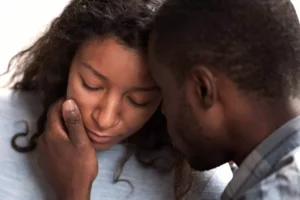“Hey babe, why don’t we go out for ice cream or do something fun?” My husband asked me the day after our miscarriage. He was trying so hard to cheer me up, but I didn’t want to be cheered.
“Can’t I just be sad? Is that OK?” I asked with a heavy heart. I didn’t understand why he wanted me to rush past my grief, or why he wasn’t sadder. Why wasn’t he in a pool of tears like I was?
I didn’t realize that he was coping with his own sadness post miscarriage by suppressing his emotions to make me happy.
And to be candid, at first I was frustrated that he wasn’t grieving the same way I was. I wanted him to wail and cry — to talk it out. But what he needed was to be alone with his thoughts. He needed a different outlet than words or tears for his emotions. He needed to “fix” the situation.
Recognize he will grieve differently post miscarriage
Dr. David Diamond, a psychologist and an associate professor at the California School of Professional Psychology, put it this way: “Men often express many emotional reactions in different ways than women, so if a man is suffering from grief, he doesn’t necessarily cry or emote about it in a way that therapists or their wives might be looking for,” Diamond said. “They take action. They avoid. They become workaholics sometimes to cope or alcoholics. Men don’t always show their reactions as grief or loss, and sometimes the people around them — and they themselves — don’t connect that with the real source when it’s a miscarriage.”
There Is Still Hope for Your Marriage
Different grief does not mean less
Miscarriage is often portrayed as a woman’s issue. And yes, women are affected differently because they felt the physical presence of a tiny baby inside of them. But the implications of a miscarriage also have an impact on men. They, too, have dashed hopes and dreams. They, too, will deeply mourn, weep and feel.
Christopher Dale wrote about his wife’s miscarriage for Parents:
Women bear the brunt of miscarriages through sheer biology. What I can say — and I hope it’s a comfort to women who’ve experienced or fear miscarriage — is that men suffer their own trials following such tragedy. … [W]e can be there for our wives, but can’t do much to ease the physical discomfort and emotional stress that carrying a living thing inside you brings. And when that living thing dies, a man’s pregnancy powerlessness becomes that of a bystander watching his beloved go through unimaginable heartache.
Remember his need to fix the situation
The best way for a husband to process his grief post miscarriage might be in trying to “fix” it the best he can. That might mean helping his wife cope with her grief by being a shoulder to cry on. It might look like commemorating the life of the baby by writing a letter, planting a tree or building a frame to host the baby’s tiny footprint. No matter what method he chooses, it is important for you, his wife, to realize that he is “fixing it” because he loves you and wants to take away your pain as much as he can.
Give him space but don’t withdraw
Sometimes the best way to love someone through pain is to give him or her some breathing room. Let your husband go for a hike or a run alone. Encourage him to go hunting or fishing or to do whatever it is that he loves. Give freedom for space, but don’t withdraw from him because you’re upset he isn’t grieving the same way as you.















